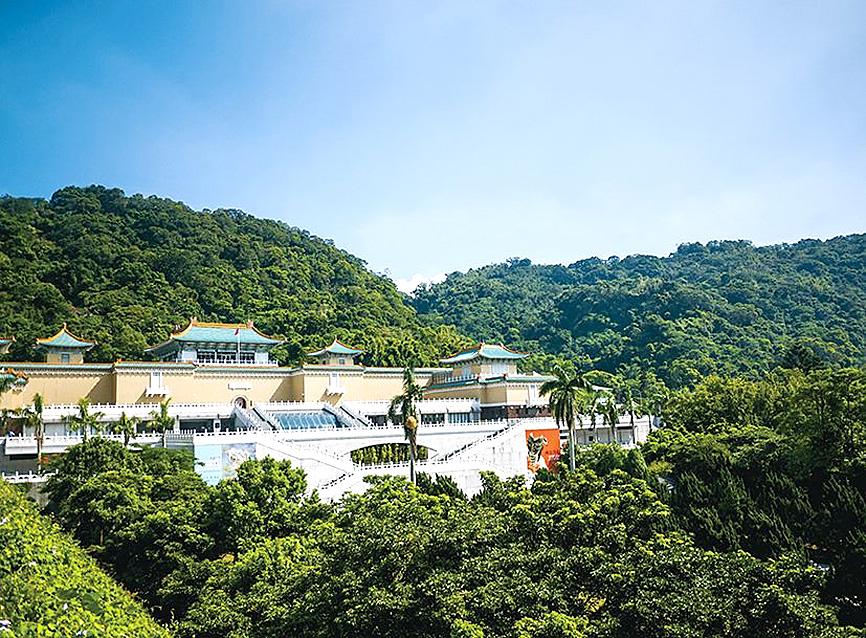The Executive Yuan has listed the National Palace Museum as critical national infrastructure, a source familiar with the issue said on Saturday.
It also listed the Jinshan Nuclear Power Plant in New Taipei City’s Shihmen District (石門), the Guosheng Nuclear Power Plant in Wanli District (萬里) and the Ma-anshan Nuclear Power Plant in Pingtung County’s Ma-anshan (馬鞍山), but removed the Fourth Nuclear Power Plant in New Taipei City’s Gongliao District (貢寮), as it has been mothballed.
The Executive Yuan regularly reviews the designation of critical infrastructure to bolster the nation’s information security, as listed establishments and facilities must submit an information safety plan to the government body.

Photo courtesy of Taipei Rapid Transit Corp
The authorities overseeing the listed entities have prepared self-assessment reports, which are to be delivered to the Executive Yuan for review next month and in September, the source said, adding that the Executive Yuan plans to complete the list by October and an information security review by the end of this year.
However, the museum would not have to submit an information security plan to the Executive Yuan, as it has an isolated intranet, the source added.
Hospitals that use round-the-clock smart monitors have also been listed as critical infrastructure and their information security should be regulated, the source said.
With the increased use of artificial intelligence, data on patients’ physical conditions can be monitored at all times, they said, adding that the Executive Yuan would regulate information security at some of the hospitals, as such data are related to people’s well-being.
Most of the nation’s large financial holding companies were not listed, but the Executive yuan would manage information security at some of them, due to the importance of online transactions, the source said.
Critical infrastructure are categorized by energy, water resources, communications, transportation, finance, emergency medical care, central and local government agencies, and high-tech parks, they said.
CPC Corp, Taiwan (CPC, 台灣中油), Taiwan Water Corp (台水公司), and Taiwan Power Co’s (台電) Central Dispatch, Control Center and substations have been included in the list, they said.
Government officials said they cannot elaborate on the listed entities or disclose their number for security reasons.

A Ministry of Foreign Affairs official yesterday said that a delegation that visited China for an APEC meeting did not receive any kind of treatment that downgraded Taiwan’s sovereignty. Department of International Organizations Director-General Jonathan Sun (孫儉元) said that he and a group of ministry officials visited Shenzhen, China, to attend the APEC Informal Senior Officials’ Meeting last month. The trip went “smoothly and safely” for all Taiwanese delegates, as the Chinese side arranged the trip in accordance with long-standing practices, Sun said at the ministry’s weekly briefing. The Taiwanese group did not encounter any political suppression, he said. Sun made the remarks when

PREPAREDNESS: Given the difficulty of importing ammunition during wartime, the Ministry of National Defense said it would prioritize ‘coproduction’ partnerships A newly formed unit of the Marine Corps tasked with land-based security operations has recently replaced its aging, domestically produced rifles with more advanced, US-made M4A1 rifles, a source said yesterday. The unnamed source familiar with the matter said the First Security Battalion of the Marine Corps’ Air Defense and Base Guard Group has replaced its older T65K2 rifles, which have been in service since the late 1980s, with the newly received M4A1s. The source did not say exactly when the upgrade took place or how many M4A1s were issued to the battalion. The confirmation came after Chinese-language media reported

The Taiwanese passport ranked 33rd in a global listing of passports by convenience this month, rising three places from last month’s ranking, but matching its position in January last year. The Henley Passport Index, an international ranking of passports by the number of designations its holder can travel to without a visa, showed that the Taiwan passport enables holders to travel to 139 countries and territories without a visa. Singapore’s passport was ranked the most powerful with visa-free access to 192 destinations out of 227, according to the index published on Tuesday by UK-based migration investment consultancy firm Henley and Partners. Japan’s and

BROAD AGREEMENT: The two are nearing a trade deal to reduce Taiwan’s tariff to 15% and a commitment for TSMC to build five more fabs, a ‘New York Times’ report said Taiwan and the US have reached a broad consensus on a trade deal, the Executive Yuan’s Office of Trade Negotiations said yesterday, after a report said that Washington is set to reduce Taiwan’s tariff rate to 15 percent. The New York Times on Monday reported that the two nations are nearing a trade deal to reduce Taiwan’s tariff rate to 15 percent and commit Taiwan Semiconductor Manufacturing Co (TSMC, 台積電) to building at least five more facilities in the US. “The agreement, which has been under negotiation for months, is being legally scrubbed and could be announced this month,” the paper said,